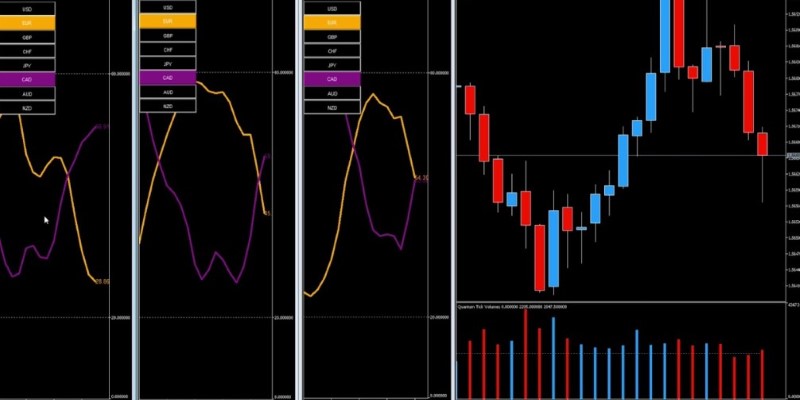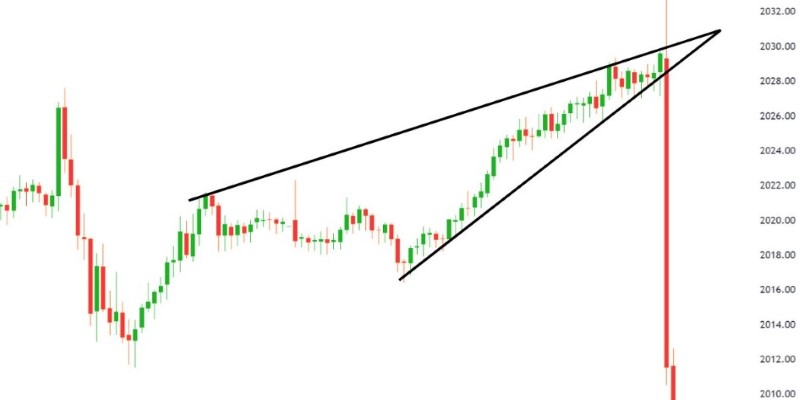Forex Made Simple: How to Harness the Power of a Currency Strength Meter
Oct 21, 2024 By Aldrich Acheson
Advertisement
Forex trading involves analyzing and predicting the movements of various currencies to make profitable trades. One of the most useful tools in this process is the Currency Strength Meter. This tool helps traders gauge the relative strength of different currencies, which can be crucial in deciding which currency pairs to trade.
It offers visual insights into which currencies are strengthening or weakening, providing a clearer understanding of market trends. This article will guide you through how to effectively use a currency strength meter to improve your Forex trading strategy.
What is a Currency Strength Meter?
A Currency Strength Meter is a technical analysis tool designed to measure the relative strength of different currencies in the Forex market. It gathers real-time exchange rate data from various currency pairs and displays it in an easily interpretable formatoften using graphs or numerical rankings.
The meter ranks currencies from strongest to weakest, helping traders identify potential trades based on market conditions. It is an essential tool for both novice and professional Forex traders, especially those involved in fast-paced environments like day trading or scalping.
How Does a Currency Strength Meter Work?
A currency strength meter analyzes a currency's performance across various pairs and summarises its relative strength. It gathers real-time exchange rate data from multiple pairs (like EUR/USD or GBP/USD) and calculates how each currency is performing against the others. The tool uses algorithms to aggregate the data, sometimes factoring in elements like volatility or volume to offer a more precise measurement. The output is typically displayed as a chart or numerical ranking, showing which currencies are strengthening or weakening.

You can adjust the timeframe to suit your trading style, whether you're a short-term scalper or a long-term investor. Some advanced meters even include directional arrows to indicate whether a currency is gaining or losing strength, providing further insight into potential market trends. While helpful, its best to use the currency strength meter alongside other tools for a comprehensive market analysis.
Using a Currency Strength Meter for Trading
Now that your currency strength meter is set up, heres how to use it effectively in your trading strategy:
Identify Strong and Weak Currencies
The primary purpose of the currency strength meter is to help traders identify the strongest and weakest currencies. Traders typically want to pair a strong currency with a weak one to maximize profit potential. For instance, if the meter indicates that the USD is strong and the JPY is weak, a trader might choose to buy the USD/JPY pair, staking that the USD will appreciate against the JPY.
Trend Confirmation
While the currency strength meter indicates currency strength, it's essential to confirm trends using other technical indicators. For example, after identifying a strong or weak currency, traders can use tools like the Relative Strength Index (RSI), Moving Averages, or Bollinger Bands to confirm the trend and ensure that the meter's readings align with market behavior.
Avoid Overlapping or Opposing Trades
Currency strength meters are helpful for managing portfolio risk. If a trader holds multiple positions, the meter can help avoid placing trades that cancel each other out. For example, if you're long on the USD/EUR and short on the USD/JPY, you might be unwittingly staking both for and against the USD. By identifying correlations between pairs, you can avoid taking opposing positions that negate your gains.
Hedging
Traders can also use the currency strength meter to hedge their positions. If you anticipate a currencys value might drop, you can open a position in a currency pair with a negative correlation to protect yourself from losses. For instance, if you're concerned that your long position on the GBP/USD may lose value, you might hedge by taking a position on USD/JPY, where the dollar could gain value if the pound weakens.
Scalping and Short-Term Trades
For short-term traders, the currency strength meter can be a valuable tool for scalping. By focusing on currencies that are showing rapid increases or decreases in strength, traders can make quick trades that take advantage of short-lived market movements. However, this strategy requires constant monitoring of the meter and real-time data to be effective.

Benefits and Drawbacks of Using a Currency Strength Meter
A currency strength meter is a useful tool for traders to gauge the performance of different currencies. Like any tool, it has advantages and limitations. Below is a closer look at its benefits and potential drawbacks.
Benefits of Using a Currency Strength Meter
Quick Overview: The meter provides a fast snapshot of currency strength, helping traders make quick decisions without analyzing each pair separately. This can save time and simplify trade analysis.
Identifies Trade Opportunities: It helps traders spot strong and weak currencies, making it easier to pair them for potentially profitable trades. This is especially useful in strategies like trend trading.
Risk Management: By highlighting correlated currencies, the meter aids in managing risk, preventing traders from entering trades that might cancel each other out.
Drawbacks of Using a Currency Strength Meter
Limited Data: The meter doesnt account for fundamental factors like economic events or news, so traders shouldnt rely solely on it for decisions.
False Signals: Sudden market events can distort its accuracy, leading to misleading signals. It works best when combined with other tools.
Short-Term Focus: Most currency strength meters are designed for short-term snapshots, which may not provide accurate information for long-term trading strategies. This can be problematic for traders looking to make long-term investment decisions, as the tool might not capture longer-term trends.
Conclusion
When used correctly, the currency strength meter is a powerful tool for Forex traders. It can significantly improve trading decisions by highlighting strong and weak currencies, confirming trends, and helping manage risk. However, it should not be the sole tool in your trading arsenal.
Combining it with other technical and fundamental analyses will give you a more holistic view of the market. Whether you're a beginner or a seasoned trader, mastering this tool can provide a vital edge in the competitive world of Forex trading.
Advertisement
-
 Currency Oct 22, 2024
Currency Oct 22, 2024How Order Books and Depth of Market Influence Trading Decisions
How order books and depth of market (DoM) influence trading decisions. Discover their operational principles, how they reveal market liquidity, and their role in modern trading strategies in 2024
-
 Investment Jan 03, 2024
Investment Jan 03, 2024How Does Homeowners Insurance Work?
Need to know how homeowners insurance works? We've got you covered! Read our step-by-step guide to learn about the ins and outs of finding the right policy for your home. Find out what is covered by homeowners insurance and more!
-
 Know-how Feb 09, 2024
Know-how Feb 09, 2024Are You Financially Healthy?
Take control of your finances and increase financial literacy with our expert tips! Learn about budgeting, understanding how money works, and more to gain financial security.
-
 Currency Oct 22, 2024
Currency Oct 22, 2024Spotting a Rising Wedge: Predict Market Reversals with Confidence
Uncover how the rising wedge pattern helps predict bearish reversals in trading. This guide will explain how the pattern works, its characteristics, and strategies for trading in 2024
